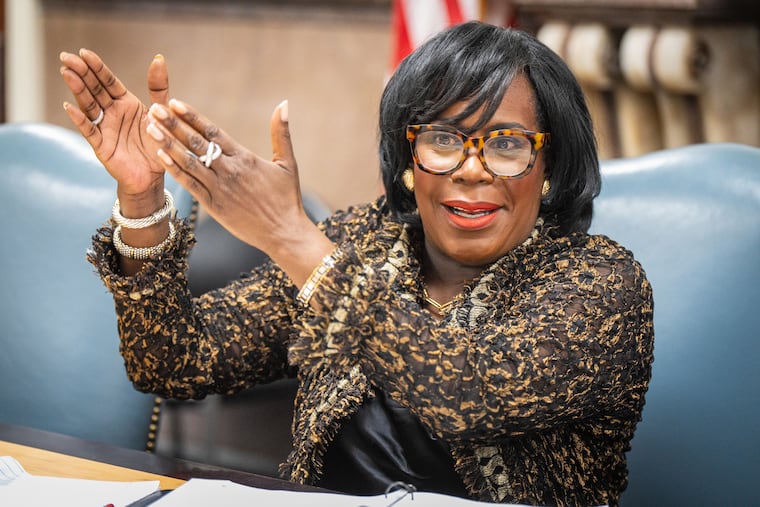Mayor Cherelle Parker is asking Philly’s ‘eds and meds’ to help fill holes in the city budget, sources say
Despite being some of the largest employers in the city and most having budgets or endowments in excess of $1 biIlion, Philly’s "eds and meds" are exempt from paying many local taxes.

Mayor Cherelle L. Parker last month convened representatives from Philadelphia’s major educational and medical institutions with a simple message: The city needs your help.
The Feb. 20 meeting included lobbyists or other representatives for Drexel University, Children’s Hospital of Philadelphia, Temple University and its health system, the University of Pennsylvania and its health system, and Thomas Jefferson University and its health system, according to multiple sources with knowledge of the meeting who spoke on the condition of anonymity to discuss the private gathering.
Despite being some of the largest employers in the city and most having budgets or endowments in excess of $1 billion, Philly’s “eds and meds” institutions, as they are often called, are exempt under state law from paying many local taxes because they are nonprofits, and activists have long called for them to do more to help the city.
» READ MORE: Jefferson Health CEO says the system is exploring moving headquarters out of Philadelphia
But if the meeting was meant to persuade the nonprofit leaders to invest more in Philly, it might not have had the desired effect. Two weeks later, the CEO of Jefferson Health publicly floated the possibility of the rapidly growing health system moving its headquarters out of the city.
Neither Parker’s office nor any of the educational and medical institutions responded to requests for comment.
The Philadelphia nonprofits are largely exempt from paying the real estate tax, which helps fund the city budget and the school district. As of 2021, the assessed value of tax-exempt property owned by educational institutions was $7.2 billion, and medical and health facilities owned an additional $2.3 billion, according to a study by the Pew Charitable Trusts, a nonprofit that researches public policy issues.
For years, progressive activists have called for the city’s large nonprofits to contribute their fair share to city and school district coffers by making payments in lieu of taxes, or PILOTs. Penn in 2020 pledged to donate $100 million over 10 years to help the school district with lead and asbestos abatement in school buildings, but that remains well below what critics of the school say it ought to pay in a PILOT agreement.
During the February meeting, Parker did not ask for PILOTs, the people with knowledge of the meeting said. Instead, the mayor left open-ended how the institutions could help the city.
The city presented the request in the context of a municipal budget with holes to fill, the sources said, pointing to the loss of wage tax revenue from suburbanites who used to commute into the city but now work remotely; the loss of the potential for the city to benefit from the $50 million in community benefits associated with the 76ers’ abandoned plan to build an arena in Center City; and the potential loss of revenue as Parker and City Council, at the encouragement of the business community, contemplate big cuts to the city business tax during this spring’s budget negotiations.
Parker made it clear she expected the institutions to step up to the plate to help the city budget, which is currently $6.8 billion.
The mayor will unveil her proposal for the next city budget Thursday, kicking off months of negotiations with Council over the city’s taxing and spending plans for the fiscal year that begins July 1. She is expected to explain how she plans to pay for her major housing initiative, continue her efforts to clean up the drug market in Kensington, and potentially pitch changes to the tax code.
» READ MORE: No tax on businesses? The Philadelphia Tax Reform Commission is calling for a major change
Parker is also expected to address the city’s efforts to revitalize the beleaguered East Market Street corridor, which has become a major issue in her tenure due to the 76ers’ scrapped proposal and the impending closure of the Macy’s store in the historic Wanamaker Building.
Jefferson Health CEO Joseph Cacchione’s comments last week to the Philadelphia Business Journal about potentially moving the health system’s headquarters, currently at 11th and Market Streets, have not made that task any easier.
“One of the things we have to think about, as much as I hate to say it, is does it make sense for our headquarters to be [in Center City],” Cacchione said, noting that Jefferson’s sprawling network now stretches from the Lehigh Valley to South Jersey.
He mentioned the city wage tax, which is paid by workers and is one of the local taxes that nonprofits and their employees are not exempt from.
“I’ve had conversations with [the mayor] about this, and she is quite concerned about it,” Cacchione said. “Jefferson is probably the largest employer in Center City right now. We have probably $96 million of wage tax that are paid to the city.”
Staff writer Susan Snyder contributed to this article.